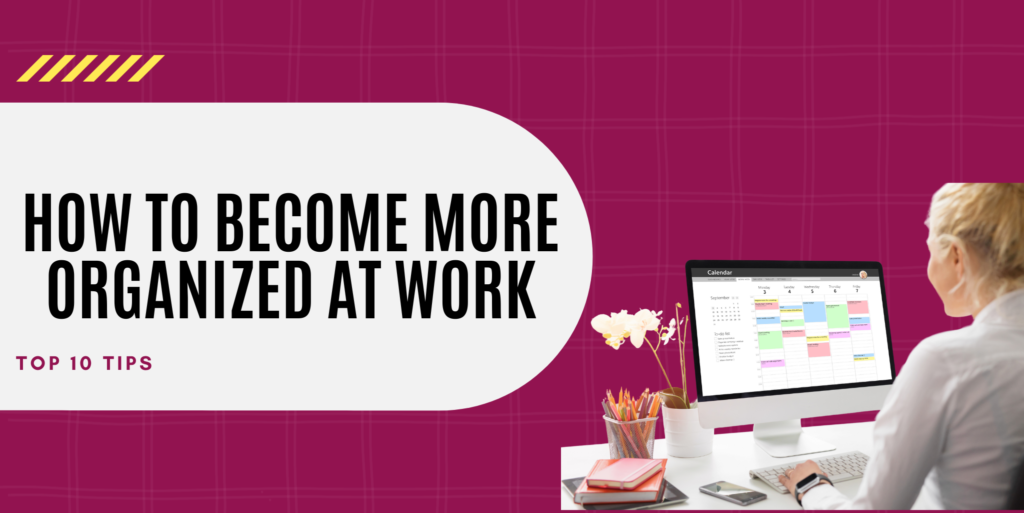Finding ways to become more organized at work is important to productivity and efficiency in today’s hectic workplace. If not managed well, juggling many projects, deadlines, and responsibilities can quickly become too much to handle. On the other hand, anyone may develop habits that result in improved workflows and organization with the appropriate approach and mindset. These ten tips will help you improve your organizing abilities at work, regardless of whether you’re finding it difficult to manage your job or just want to get more organized.
Top 10 Tips to Become More Organized at Work
-
Establish a Routine
Making a daily schedule is one of the best ways to stay organized at work. Maintaining a regular schedule will help you keep organized and focused on your work. Begin by defining your everyday tasks and setting specific time slots for work. Start by listing your daily tasks and allocating dedicated time slots for doing them. Since overworking can result in burnout and lower productivity, make sure that you include breaks into your schedule for relaxation and refreshment.
-
Take Breaks
Although it may seem irrational taking regular breaks at work is important for sustaining productivity and organizing oneself. Studies have indicated that little pauses during the workday might enhance focus, creativity, and satisfaction with work. During your breaks, get up from your desk, stretch your legs, and decompress. You’ll return to your tasks feeling refreshed and prepared to take on them with renewed attention if you allow yourself to take breaks.
-
Delegate Tasks
It’s important to understand that you don’t have to do everything yourself when faced with a difficult task. Effective delegating duties is a useful ability that helps keep you organized and lower your stress levels. Determine the responsibilities that can be assigned to team members or coworkers while keeping in mind their qualifications. In addition to freeing up your time for other essential tasks, delegation promotes cooperation and teamwork within your company.
-
Avoid Multitasking
While Multitasking might appear to be a time-saving strategy, it might actually reduce output and increase mistakes. Research has shown that the human brain is not built to focus on numerous activities at once, and trying to do so can lead to poor performance and higher stress.
Give each task your full attention and concentrate on it rather than attempting to multitask. You will probably discover that when you do this, you can finish it more quickly and accurately.
-
Plan Ahead
Staying organized at work requires effective planning, mainly when dealing with multiple goals and tight deadlines. Make a plan for the tasks at hand and allot time for them at the start of each workday or workweek. Divide more complicated projects into smaller, attainable jobs, and give each one a reasonable timeframe. Having a well-defined strategy can help you stay organized and less stressed because you’ll know exactly what needs to be done and when.
-
Set Goals
When you’re feeling overwhelmed at work, setting goals is a great approach to getting organized. By setting specific goals for yourself, you can maintain your motivation and attention in the face of challenges and failures. Establish attainable short—and long-term goals that complement your career goals and divide them into manageable chunks. Review your progress toward your goals regularly and modify your strategy as necessary. Setting and achieving objectives can give you direction and a feeling of purpose, which will keep you focused and organized.
-
Prioritize Tasks
Since not all tasks are created equal, developing your ability to prioritize is essential to being well-organized at work. When dealing with numerous assignments and due dates, consider each one carefully to determine its priority and urgency. To organize your work and set priorities, use tools like project management software or to-do lists. Prioritize finishing high-priority activities first, and don’t be hesitant to decline requests or distractions that aren’t necessary. Setting priorities for your projects will help you make the most of your time and effort.
-
Time Management
Managing your time well is essential to maintaining organization at work and increasing output. Develop time management measures, such as blocking off time specifically for a task or dividing your work into intervals using a technique like the Pomodoro Technique. Use your time effectively by recognizing and getting rid of time-wasting habits like constant email checking and pointless meetings. You can do more in less time and experience less stress if you manage your time well.
-
Clean up Regularly
It can be challenging to remain focused and productive when one’s workstation gets cluttered because it might cause disarray and distraction. Make time to routinely clean and arrange your workspace, getting rid of clutter and making it a neat, practical space. Store or file any papers or documents you don’t need immediately and keep the necessities close at hand. You may foster a more productive work atmosphere by keeping your desk tidy and orderly.
-
Eliminate Distractions
Learning to reduce distractions is essential for maintaining organization at work, as they are a major source of lost productivity. Take action to reduce or eliminate typical sources of distraction in your workplace, such as social media, noise, and interruptions from coworkers. Use devices like internet blockers or noise-canceling headphones to reduce outside distractions and foster a concentrated work atmosphere. Set limits with coworkers and, if needed, express your desire for uninterrupted work time. By reducing distractions, you may stay focused and productive throughout the day.
Conclusion:
To succeed in the rapid workplace of today, workplace structure is a must. These ten tips can help you develop habits that will keep you productive, focused, and organized. These methods can be a big help in your daily routine, whether you’re having trouble keeping up with your workload or you just want to improve your organizational skills. It’s important to remember to create a schedule, take breaks, delegate work, avoid from Multitasking, plan ahead, make goals, prioritize your work, use strategies for time management, tidy up often, and remove distractions. You’ll be well on your way to becoming a more productive and organized worker if you do this.
Written by: Adeeba Shah



